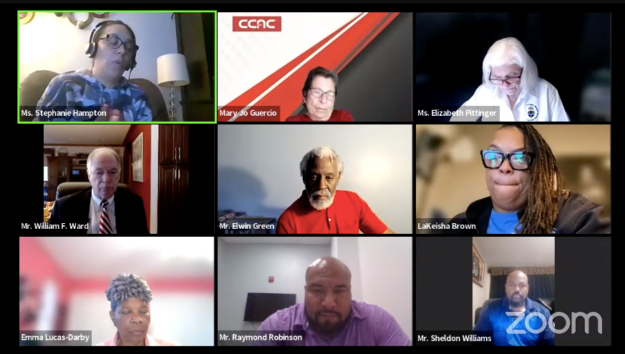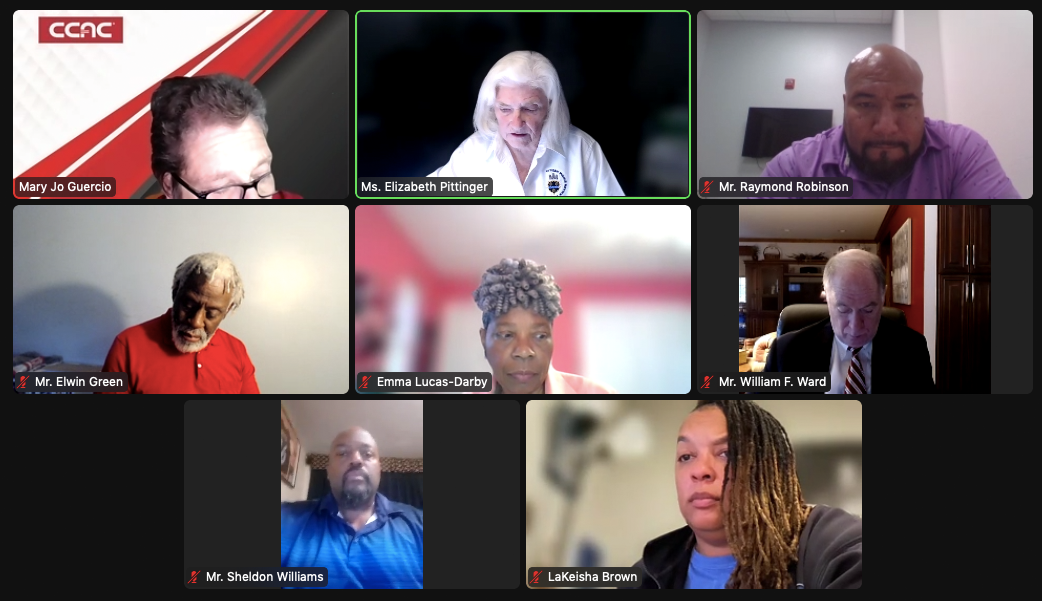
Post by Nigel Parry. The Board Meeting Blog is an unofficial citizen record of the meetings and does not reflect any official CPRB position or policy, and is simply offered as a quick way of keeping up with what happens at the board meetings. Quotes may be shortened and sometimes paraphrased for clarity. Watch full-length video recordings of all CPRB meetings at cprbpgh.org/for-public-record/video/
BOARD PRESENT: Elizabeth C. Pittinger, MPM (Executive Director); Ms. LeKeisha Brown (City Council Seat #1: Non-LEP*); Dr. Mary Jo Guercio (Council Seat #4, Non LEP); Mr. Raymond Robinson (Mayoral Seat #5, Non-LEP); Dr. Emma Lucas-Darby, Chair (Mayoral Seat #6:Non-LEP); Mr. Sheldon Williams (Mayoral Seat #7: LEP), Mr. Elwin Green (City Council Seat #3: Non-LEP); *Law Enforcement Professional
STAFF PRESENT: William F. Ward, Esq (CPRB solicitor); Stephanie Hampton (Assistant Executive Director); Sherry Bridget (Community Liaison); Da’Mesha Carpenter (administrative assistant); Mr. Elwood (investigator).
The July 25th Board meeting minutes were approved without any amendments.
DIRECTOR’S REPORT
Executive Director Elizabeth Pittinger gave her report. CPRB has received 178 complaints to date this year.
Ms. Pittinger noted that CPRB had a busy summer break, with the Black Political Empowerment Project’s (B-PEP) Community Engagement series “number one on the list”.
NEW CPRB STAFF
As well as Ms. Pittinger presenting at these meetings, CPRB’s new community liaison staff member, Ms. Sherry Bridget, has been attending the B-PEP series, as well as attending City Public Safety Committee meetings and other local police accountability-related community meetings.
CPRB’s new administrative assistant, Da’Mesha Carpenter, began her duties on August 7th. She had previously worked as an intern in CPRB’s office in 2019, and has since graduated from the University of Alabama.
She is also a participant in the Citizen Police Academy’s current 12-week program. Ms. Pittinger was at the opening night of the program last Wednesday, together with the manager of the City’s Office of Municipal Investigations, Erin Bruni, for police accountability training.
PUBLIC SAFETY COUNCIL
At the Zone 4 Public Safety Council last week, there was discussion about the Community Wellness Office directed by Dr. Ross, a project that started a couple of years ago which is now piloting a community response unit in Zone 1 and Zone 2 in which a mental health professional accompanies police officers. Tiffani Hunt gave a presentation on de-escalation. Pittsburgh Police Community Relations Officer Christine Luffey gave a report about the calls they receive.
COMMUNITY CONVERSATION SERIES
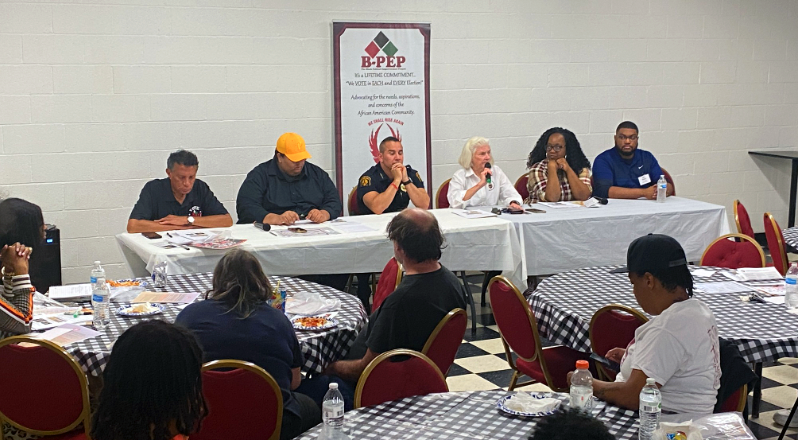
On September 21, the Black Political Empowerment Project (B-PEP) Pittsburgh Branch held the third of five in its “Community Conversation Series with Pittsburgh Bureau of Police Chief Larry Scirotto” at the Beulah Baptist Church in Beltzhoover. (Photo: BPEP)
Ms. Pittinger congratulated the organizers of the Community Conversation Series, the Black Political Empowerment Project (B-PEP) in partnership with the Alliance for Police Accountability (APA), NAACP Pittsburgh Branch, and the Urban League of Greater Pittsburgh. The conversations are a series of five meetings in different neighborhoods around the city which is a conversation with the Police Chief and Ms. Pittinger to talk about community-police relations, what expectations are, and the realistic ability to meet those expectations.
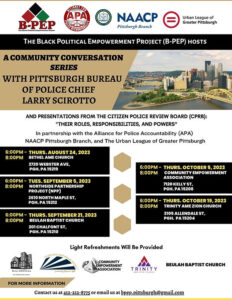 The first event was held on The Hill on August 24th at Bethel AME, which Dr. Darby also attended, the second one covering the Northside was held by the Northside Partnership Project on September 5th, and the third at Beulah Baptist Church on September 21st, to cover the Hilltop communities.
The first event was held on The Hill on August 24th at Bethel AME, which Dr. Darby also attended, the second one covering the Northside was held by the Northside Partnership Project on September 5th, and the third at Beulah Baptist Church on September 21st, to cover the Hilltop communities.
There are two remaining events, on Thursday October 5th at the Community Empowerment Association to cover Homewood, and Thursday October 21st at Trinity Ame Zion Church to cover the West End neighborhoods.
Dr. Emma Lucas-Darby spoke about the August 24th Community Conversation event, emphasizing that she was pleased that people were coming to the meetings and seeking out information from public officials.
In response to a question from Dr Darby about there only being question cards available for the public at the first meeting, Ms. Pittinger noted that while the cards still were used, later meetings saw attendees given the opportunity to ask questions via microphone.
THE NEW “SENTINEL REVIEW TASK FORCE”
The last Mayor’s quarterly meeting with activists took place on September 5th. Discussion covered the end-August arrest of Jashon Martin, in which video captured showed a Pittsburgh police officer punching the suspected drug dealer in the head after he was pinned to the ground by other officers.
On Friday, September 1st, Mayor Ed Gainey announced plans to form a new advisory board called the “Sentinel Review Task Force”, made up of community leaders from different backgrounds. This idea has developed into something that seems “more of an advisory committee to the police chief,” Ms. Pittinger commented, “somewhere where the Chief can have candid discussions about what is happening in the neighborhoods and… getting a feel from the streets… There’s been mention of the inclusion of national experts.”
The Police Chief asked Ms. Pittinger if she would serve on that committee, which she agreed to, “as long as it’s consistent with the Board’s mission.”
There is limited information about the committee and its plans at this point. “It’s the Chief and Mayor’s prerogative to speak to anyone they choose…. We’ve been clear in any public discussion: ‘Don’t even think about undermining the Board’s authority because CPRB is established under the Charter.’”
There was also discussion about accreditation. An accreditation program was introduced by the Pennsylvania Chiefs of Police Association in the summer of 2001 and has since accredited over 183 agencies across the Commonwealth.
The Pittsburgh Bureau of Police was accredited by the Pennsylvania Chiefs of Police Accreditation Commission in 2014. At the time, Dane Merryman, executive director of the Pennsylvania Chiefs of Police Association told Liz Navratil of the Pittsburgh Post-Gazette that:
“…a team of assessors evaluated Pittsburgh police policies—including policies for use of force, firearms training and other hot-button topics—to ensure that they met the commission’s 150 standards for police departments. They then reviewed police bureau reports to ensure that officers were actually acting within those standards.” [Source]
“Accreditation requires that officers stay true to their oath and enforce the laws of the City, of the State, and the US Constitution,” Ms. Pittinger continued. “When local elected officials create policy that is in conflict with State statutes, there becomes an issue of ‘who does the officer follow, what do they do?’ It puts them in a Catch-22. And that’s what’s happened with their accreditation.”
“The City of Philadelphia found itself in a similar situation to Pittsburgh,” Ms. Pittinger continued. “Both cities adopted a local ordinance directing local police on traffic stops and what were considered ‘primary’ and ‘secondary’ violations.”
“The Motor Vehicle Code is a state statute that preempts the local. As a result, Philadelphia found itself in a court situation. What has happened is that accreditation has been waived for those areas of the Motor Vehicle Code. This will need to be resolved before re-accreditation.”
“The important thing is that accreditation establishes a minimum standard of performance of police officers in an agency so that the public can trust that—at a minimum—they are maintaining performance up to the best practices of the time. Seeking this accreditation was a promise made to the community of Pittsburgh after the Consent Decree expired.”
ACCESS TO BODYCAMS
Another point of discussion was relating to the release of bodycam footage to the public. This issue is also addressed in a Pennsylvania state statute. The Bureau promised to investigate and clarify in which circumstances bodycam footage would be released.
USE OF FORCE
Finally, there was a discussion about the Use of Force. Pittsburgh Police Order 12-6 details official police procedure in the city.
RECRUITMENT OF NEW CPRB INVESTIGATORS
Response to the posting of the two positions has been good, interviews with potential candidates begin next week. Anyone coming in will have to complete the National Association for Civilian Oversight of Law Enforcement’s (NACOLE) Certified Practitioner of Oversight (CPO) Credential Program. Current CPRB staff are involved in that right now. Requirements are:
To qualify for certification, a participant must receive a minimum of 45 credit hours of NACOLE certified training and attend two annual NACOLE conferences within three consecutive years. Of those 45 credit hours, participants must receive a minimum of 1.5 credit hours in each of NACOLE’s 6 core competencies (Civilian Oversight of Law Enforcement, Investigations, the Public and Transparency, Law, Policing/Law Enforcement Policies & Procedures, Remediation and Discipline). In addition, participants are required to read two items from the approved reading list. All certification requirements must be completed in a three-year period and it is the responsibility of the participant to report their hours using the forms found through clicking on the “CPO Program Resources” link above.
After the initial certification, a participant can maintain their certification by receiving no less than 30 credit hours of NACOLE certified training and attending a minimum of one annual NACOLE Conference within the following three year period. Those seeking to maintain their certification will also be required to read two additional entries from the approved reading list during this time. The three year recertification period will begin on January 1st of the year following the completion of the initial certification. If recertification is not completed in this three-year period, participants must re-apply for the initial certification and complete all requirements to obtain new CPO credentials.
CURRENT CPRB CASE REVIEW
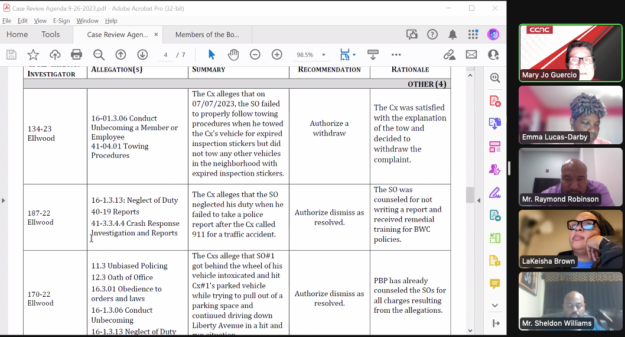
After some clarifying questions, the recommendations (as listed in the Case Action Agenda) were accepted and passed.
Please browse CPRB’s Case Action Agendas here for case-related documents and information: https://cprbpgh.org/for-public-record/action-case-status-reports
The next CPRB Board meeting will take place on October 24th, 2023 at 6pm ET. Check CPRB’s meetings page for links to agendas, draft and approved minutes, current case actions, meeting video, and other documents.
Watch the September 26th Board meeting
Post by Nigel Parry. The Board Meeting Blog is an unofficial citizen record of the meetings and does not reflect any official CPRB position or policy, and is simply offered as a quick way of keeping up with what happens at the board meetings. Quotes may be shortened and sometimes paraphrased for clarity. Watch full-length video recordings of all CPRB meetings at cprbpgh.org/for-public-record/video/

